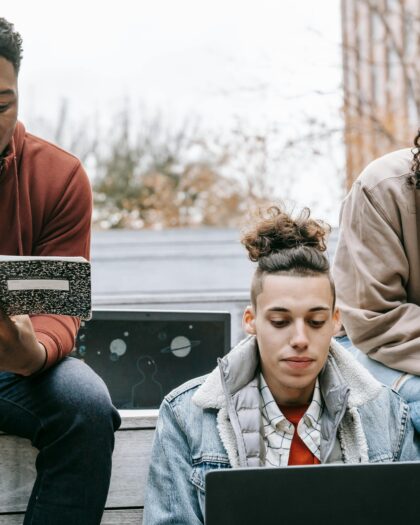I. Why the Thank You Email Still Matters in College Admissions
Picture this: An admissions officer is hunched over a laptop, scrolling through the day’s interview notes. Names blur together. Then—an email. Simple subject line: “Thank you.” Inside, a student reflects briefly but sincerely on the conversation, links it to their aspirations, and ends with a thoughtful nod to the school’s community. That email doesn’t just stand out. It sharpens the memory, re-anchors the impression, and—frankly—makes the officer’s job easier.
Too many students walk out of interviews believing the performance ends there. It doesn’t. The thank you note is your encore. It’s where you demonstrate maturity, attention to detail, and authentic interest. In the admissions world, follow-through matters.
Think of it this way: the interview evaluates your readiness on the spot. The thank you note reveals whether that performance was luck—or habit. A well-written message conveys that you are deliberate, not performative. It suggests intellectual curiosity, not just polish. And it confirms that you value the time and insight of someone representing the institution you hope to join.
Admissions officers don’t just evaluate intellect. They’re screening for emotional intelligence, responsibility, and cultural fit. In that context, a thank you email is more than etiquette—it’s evidence. It shows you understand how to engage respectfully in a professional exchange. It signals that you are the kind of person professors want in discussion sections and classmates want on project teams.
So don’t skip it. And don’t wing it. This isn’t a throwaway gesture—it’s your final controlled impression. Use it.
II. When to Send It—and Why Timing Reflects Character
You’ve got 24 hours. Not 48. Not “whenever you get to it.” A thank you email sent the same day—or at latest, by the next morning—demonstrates that you respect the process, value the interviewer’s time, and understand the tempo of professional communication. Miss that window, and you send a different message entirely: that you’re inattentive, disorganized, or simply not that interested.
Admissions officers are busy. Their days are packed with interviews, committee meetings, and application reviews. A prompt thank you email doesn’t just show courtesy—it helps them remember you. And memory matters. Especially when decisions are being made at speed and in volume.
Let’s talk logistics. If your interview is late on a Friday or over the weekend, wait until Monday morning. That’s the first professional moment that reads as both thoughtful and timely. But don’t wait until the following week. And unless your interview was explicitly informal (coffee shop, student-led, casual tone), avoid sending messages at midnight or on Sunday evening. Good judgment is part of the impression.
As for handwritten notes: save the postage. While charming in theory, they’re unreliable in practice—slow to arrive and easy to misplace. Email is not a compromise. It’s the standard. It’s fast, direct, and—when written well—just as personal. This isn’t about being quaint. It’s about being effective. Send the note. Send it soon. And make it count.
III. What to Say—and What Admissions Officers Are Listening For
Let’s be clear: this isn’t a literary exercise. It’s a professional follow-up. A thank you email isn’t the place for flowery language, recycled enthusiasm, or generic flattery. It’s a targeted reaffirmation of who you are, what you learned, and why you still want in.
Start with your subject line. Keep it clean, courteous, and unmistakably tied to your identity. Think: “Thank you for the conversation—Priya Shah” or “Appreciate your time today—Jaden Taylor.” This helps the interviewer connect the email to the conversation without opening it.
Open with sincerity. No need for Shakespearean overtures. A direct “Thank you for taking the time to speak with me today about [School Name]” is perfect. You’re setting a respectful tone—don’t overthink it.
Next, personalize. Reference something specific from your conversation—a professor they mentioned, a class they loved, or a piece of advice they offered. This shows you were engaged, not just present. Example: “I appreciated your insights on Professor Zhang’s course on social enterprise—your enthusiasm made me even more curious about the curriculum’s flexibility.”
Then, pivot to reflection. This is the heart of your note. Briefly explain how the interview deepened your interest in the school. Highlight one or two meaningful connections between what you learned and what you value—whether that’s a particular academic focus, a student organization, or the campus culture. This is where your maturity shows. You’re not repeating facts from the website—you’re connecting your story to theirs.
Keep it short, sharp, and warm. Five to seven sentences. That’s it. No rambling narratives. No resume rehashing. Use professional language, but don’t sacrifice authenticity. If it sounds like a robot wrote it, start over.
What sticks with admissions officers? Students who listen well, reflect intelligently, and demonstrate genuine enthusiasm for the community—not just the brand. The thank you note gives you one last chance to reinforce those qualities in their memory.
One last insider tip: If your interviewer shared something personal—say, their favorite campus tradition or why they chose the school themselves—acknowledge it. A line like “I enjoyed hearing about your experience leading the Outing Club—sounds like an unforgettable part of campus life” goes further than you think. It shows you were present, not performing.
Write like someone who values the opportunity and respects the process. Because if you’re serious about getting in, that email is part of your application—even if it’s not filed in your official record.
IV. Common Pitfalls—and How to Avoid Them
A thank you email, done well, reinforces your professionalism and poise. Done poorly, it raises red flags. These are the mistakes that admissions officers remember for all the wrong reasons.
Too generic. Sending the same message to every interviewer? Rookie move. Admissions officers talk—especially at smaller schools or when interviews are coordinated centrally. If your note could’ve been written by anyone, it might as well have been read by no one. Personalize it. Reference your actual conversation. A single specific detail makes the difference between “meh” and memorable.
Overeager or transactional. This is not a negotiation. Avoid phrases like “I look forward to attending” or “Can’t wait to be on campus this fall!” unless you’ve already been admitted. You’re not trying to close a deal—you’re expressing appreciation. Don’t confuse gratitude with desperation.
Too casual. You’re not texting a friend. Emojis, informal abbreviations, and more than one exclamation point? Instantly undermines your credibility. Admissions officers are evaluating your readiness for a professional and academic environment. Write like someone who belongs in one.
Too long. This isn’t your second shot at the personal statement. If your note requires scrolling, you’ve gone too far. Keep it to a few tight paragraphs. One idea, clearly delivered, lands harder than a paragraph parade of achievements.
Missed opportunities. A thank you note without a reference to the actual conversation sounds like it came off an assembly line. Even one well-placed reference—to a specific program, professor, or anecdote—can prove that you listened and cared.
Bottom line: Treat your thank you note like a mini-interview. Be intentional, be specific, and above all—be someone your interviewer would want to advocate for.
V. Special Situations: Group Interviews, Student Interviewers, and Alumni Conversations
Not all interviews are one-on-one, and not all interviewers wear admissions badges. But your standard doesn’t change. Regardless of who you spoke with—or how many—the thank you note remains a strategic and professional touchpoint.
Group or panel interviews: If possible, send individual notes. Yes, it’s extra effort. That’s the point. Personalize each one by referencing what that interviewer said or asked—“I appreciated your question about how I approach collaboration in team settings”—to show you were engaged with the full room. If individual emails aren’t feasible, a single message that acknowledges each participant by name and contribution still demonstrates attentiveness.
Student interviewers: Do not downgrade your tone. Peer interviewers—especially at schools like Yale, Princeton, and MIT—play a serious role in admissions outcomes. Write with the same polish and respect you’d use for a dean. Your tone should say: “I value your insights and recognize your influence.”
Alumni interviews: These are often looser in format, but don’t confuse informal with unimportant. Alumni are trusted proxies for the institution. Be courteous, concise, and professional. They may not have a direct vote—but they absolutely have a voice.
Virtual or international interviews: Acknowledge the format or any logistical quirks. “Thank you again for making time across time zones—I appreciated your flexibility.” This isn’t filler; it signals cultural awareness and professionalism. And yes, that matters.
Whatever the format, the rule holds: if someone gives you their time, give them your best in return.
VI. Final Thoughts: The Thank You Note as Your Closing Argument
Think of your thank you note not as an afterthought—but as your final play in a high-stakes game. After months of crafting essays, chasing down recommendations, and rehearsing interviews, this is your closing argument. A final, intentional move that reinforces everything you’ve already worked so hard to convey.
If your application was about proving you’re academically prepared, your thank you note proves you can engage like a future college student: clear, mature, and purposeful. One short email won’t win your admission. But a careless one can weaken your case—and a polished one can seal a strong impression.
This is about signaling the right things: that you listen, that you care, and that you take none of this for granted.
Want to make sure your note hits the right tone? At MBA Exchange, we’ve helped thousands of applicants refine every component of their campaign—from the personal statement to the final thank you. Book a free consultation to ensure your message lands with clarity and impact.





